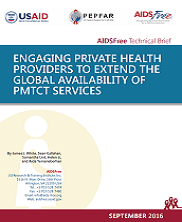Global efforts to extend the availability of prevention of mother-to-child HIV transmission (PMTCT) services have dramatically reduced the number of babies born HIV-positive. However, new HIV infections among pregnant women, newborns, and infants remain unacceptably high, with mother-to-child transmission persisting as the most common route of new pediatric infections globally. To eliminate MTCT, HIV programs are increasingly seeking ways to engage private actors more fully in expanding and sustaining national HIV and PMTCT responses.
Building on technical guidance outlined by the U.S. Agency for International Development (USAID), AIDS Support and Technical Assistance Resources, Task Order 1 (AIDSTAR-One) Project, and the USAID Strengthening Health Outcomes through the Private Sector (SHOPS) Project, this technical brief presents a spectrum of private sector engagement options to increase the supply of PMTCT services that vary in degree of public-private collaboration, source of financing, and source of logistic, commodity, and diagnostic inputs. This brief explores private models of financing and delivering care, as well as public-private partnerships (PPPs) and joint ventures. It also presents a range of community-level interventions led by private actors, demonstrating how the private sector can contribute to demand creation, PMTCT and antiretroviral therapy delivery, and adherence and retention activities. The discussion includes successes, lessons, and challenges that can inform the efforts of governments, donors, and implementers to adapt or replicate private sector models in new settings.


